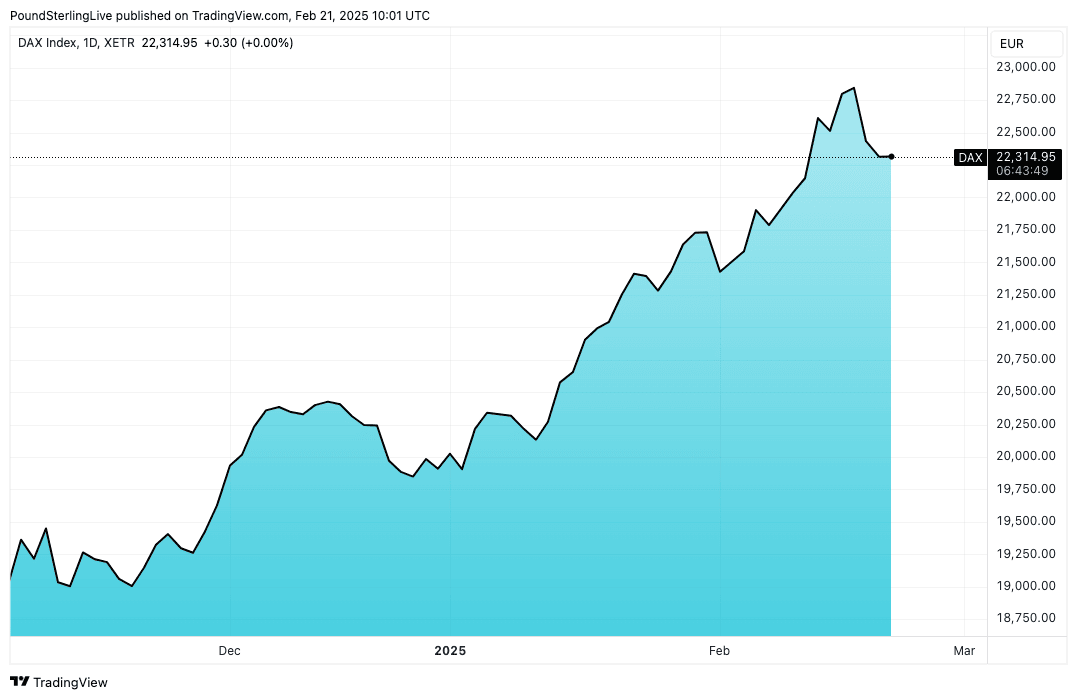Germany's Election Could Ignite "Stock Boom"
- Written by: Sam Coventry
-

Image courtesy of conceptphoto.info. Reproduced under CC licensing conditions.
Germany’s federal election could trigger a major rally in the country’s stock market.
It could particularly benefit small and mid-cap companies, as investors anticipate economic reforms and potential fiscal policy shifts, according to Nigel Green, CEO of deVere Group.
"If Conservative front-runner Friedrich Merz secures a coalition with the Social Democratic Party and potentially the Greens, investors expect a wave of economic reforms and a possible relaxation of the debt brake, setting the stage for a sustained bull run," Green said. "Germany’s election result could spark Europe stock boom."
The DAX Index is already near record highs, reflecting growing optimism.
Green thinks that a shift in fiscal policy allowing for more government investment could be a game changer, particularly for sectors such as defence, infrastructure, and real estate. Smaller companies, which are more sensitive to domestic policy changes, stand to benefit the most.
Above: Germany's DAX prints a series of fresh records.
deVere Group, one of the world’s leading independent financial advisory firms, sees this shift as a catalyst for long-term outperformance in German equities. “Investors are increasingly looking at Germany as the epicentre of the next European market boom,” Green added. “The election outcome could unlock a level of investment activity that we haven’t seen in years.”
European Stocks Outperforming the U.S.
The anticipated German market surge comes amid a broader shift in global equities. European stocks have been outperforming their U.S. counterparts for the first time in nearly a decade. The Stoxx Europe 600 has surged 5.6% since Donald Trump’s return to the White House, outpacing the S&P 500’s 2.5% gain and the Nasdaq Composite’s 2.2% rise.
“This dramatic shift in market sentiment signals a renewed investor appetite for European equities,” Green noted.
Several factors are fueling this momentum, he explains. Trump’s decision not to escalate tariffs against the EU has removed a major overhang for European markets. Meanwhile, renewed prospects for peace talks in Ukraine are easing geopolitical tensions and boosting investor confidence.
Additionally, the European Central Bank (ECB) is taking a more aggressive stance on interest rate cuts compared to the U.S. Federal Reserve, making European assets increasingly attractive.
“Unlike the Fed, which remains cautious about easing policy too aggressively, the ECB is decisively lowering rates to stimulate growth,” Green said. “This divergence in monetary policy is providing a significant tailwind for European equities.”
Valuations and Portfolio Rotation
A key factor underpinning this rally is valuation. European stocks have historically traded at a steep discount to their U.S. counterparts, but improving macroeconomic conditions are making this gap harder to justify.
“Even after recent gains, high-quality European companies remain significantly undervalued relative to their American peers,” Green said. “As recognition of this mispricing grows, capital inflows into Europe are accelerating.”
The investment landscape is also shifting, with a strategic rotation away from U.S. tech dominance. Higher interest rates and increasing regulatory scrutiny are prompting investors to explore alternative opportunities.
“As a result, capital is flowing into regions that offer compelling opportunities beyond the crowded tech trade,” Green said. “Europe, with its attractive valuations and central bank support, is becoming a key beneficiary.”
Long-Term Outlook for European Equities
Some analysts argue that the European rally may be short-lived, with the U.S. regaining its dominance once the Federal Reserve begins cutting rates. However, Green believes this view overlooks fundamental changes in market conditions.
“Historically, European equities have been hindered by economic stagnation and political uncertainty. Today, those headwinds are diminishing,” he said. “A decisive result in the German elections, paving the way for economic reform, could trigger a significant equity rally—one that extends beyond Germany and helps reshape Europe’s investment landscape.”





